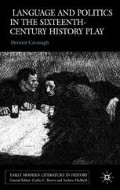Abstract
King John demonstrates the pervasiveness as well as the radical nature of Shakespeare’s interest in illicit language. The status of monarchical speech — as well as those forms of language that question or oppose this — provides the source, as with Greene’s James IV, of the dramatist’s most forceful political insights. Furthermore, disruptive speech is not simply a topic of King John, but a key ingredient in its formal composition: in brief, the play views historical events from the vantage-point offered by the discourse of rumour. As with counsel in Gorboduc, Shakespeare’s play both explores and enacts a specific form of speech; both plays also comprehend how historical pressures complicate understanding of seemingly disorderly discourses and their opposites. This is a large and unfamiliar claim for King John and it will need careful elaboration.
Access this chapter
Tax calculation will be finalised at checkout
Purchases are for personal use only
Preview
Unable to display preview. Download preview PDF.
Notes
For a comprehensive study, see Carole Levin, Propaganda in the English Reformation: Heroic and Villainous Images of King John (Lewiston, New York: Edwin Meilen Press, 1988).
Cited in John R. Elliot, ‘Shakespeare and the Double Image of King John’, ShakS, 1 (1965): 64–84, 68.
Penny Roberts, ‘Arson, Conspiracy and Rumour in Early Modern Europe’, Continuity and Change, 12 (1997): 9–29, 11. For further analysis, see Hans-Joachim Neubauer, The Rumour: a Cultural History, trans. Christian Braun (London and New York: Free Association Books, 1999).
George Cavendish, The Life and Death of Cardinal Wolsey, ed. Richard S. Sylvester, Early English Text Society (Oxford: Oxford University Press, 1959), p. 3.
Gilbert Burnet, The History of the Reformation of the Church of England, ed. Nicholas Pocock (Oxford: Clarendon Press, 1865), 7 vols., VI, p. 223; p. 224. I owe this reference to Dr Alexandra Gillespie.
James C. Scott, Domination and the Arts of Resistance: Hidden Transcripts (New Haven and London: Yale University Press, 1990), pp. 144–8.
Simon Walker, ‘Rumour, Sedition and Popular Protest in the Reign of Henry IV’, P&P, 166 (2000): 31–65. Walker is drawing here on the categories formulated by James C. Scott’s earlier study, Weapons of the Weak: Everyday Forms of Peasant Resistance (New Haven and London: Yale University Press, 1985), ch. 7.
Thomas Birch, Memoirs of the Reign of Queen Elizabeth, From the Year 1581 till her Death, 2 vols (1754), II, p. 81.
Lily B. Campbell, Shakespeare’s ‘Histories’: Mirrors of Elizabethan Policy (San Marino, California: Huntington Library, 1947), p. 169.
Frank Whigham, Ambition and Privilege: the Social Tropes of Elizabethan Courtesy Theory (Berkeley, Los Angeles, London: University of California Press, 1984), p. 3.
Emrys Jones, The Origins of Shakespeare (Oxford: Clarendon Press, 1977), p. 234.
Pauline Kiernan, Shakespeare’s Theory of Drama (Cambridge: Cambridge University Press, 1996), p. 128.
Author information
Authors and Affiliations
Copyright information
© 2003 Dermot Cavanagh
About this chapter
Cite this chapter
Cavanagh, D. (2003). Misreading History: Rumour in King John . In: Language and Politics in the Sixteenth-Century History Play. Early Modern Literature in History. Palgrave Macmillan, London. https://doi.org/10.1057/9780230005839_5
Download citation
DOI: https://doi.org/10.1057/9780230005839_5
Publisher Name: Palgrave Macmillan, London
Print ISBN: 978-1-349-50768-9
Online ISBN: 978-0-230-00583-9
eBook Packages: Palgrave Literature & Performing Arts CollectionLiterature, Cultural and Media Studies (R0)

